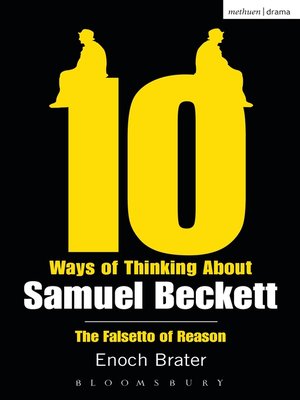Ten Ways of Thinking About Samuel Beckett
ebook ∣ The Falsetto of Reason · Diaries, Letters and Essays
By Enoch Brater

Sign up to save your library
With an OverDrive account, you can save your favorite libraries for at-a-glance information about availability. Find out more about OverDrive accounts.
Find this title in Libby, the library reading app by OverDrive.



Search for a digital library with this title
Title found at these libraries:
| Loading... |
Beginning with a chapter entitled 'Things to Ponder While Waiting for Godot', each essay deftly illuminates aspects of Beckett's thinking and craft, making astute and often surprising discoveries along the way. In a series of beguiling discussions such as 'From Dada to Didi: Beckett and the Art of His Century', 'Beckett's Devious Interventions, or Fun with Cube Roots' and 'The Seated Figure on Beckett's Stage', Brater proves the perfect companion and commentator on Beckett's work, helping readers to approach it with fresh eyes and a renewed sense of the author's unique aesthetic.
'An eloquent, witty and erudite collection of essays that illuminates Beckett's drama and prose fiction from a number of complementary perspectives. Brater's precise explication of the interwoven tropes of language and mise-en-scène is combined with a fine grasp of the overarching structure of work ... to create a rich and suggestive series of reflections on Beckett's aesthetics.' - Robert Gordon, Professor of Drama, Goldsmiths, University of London






